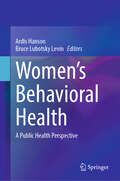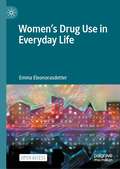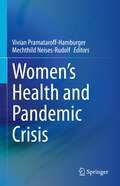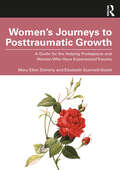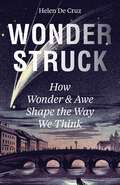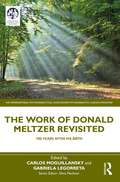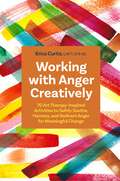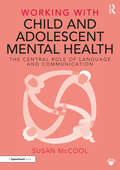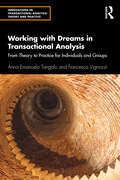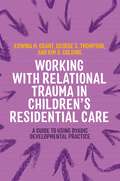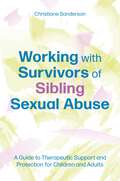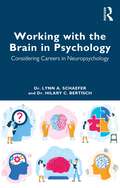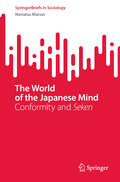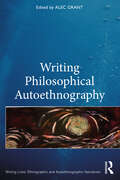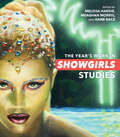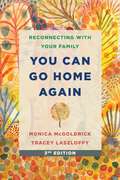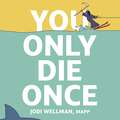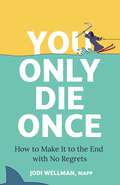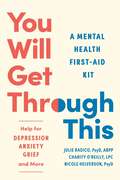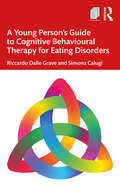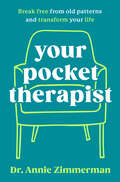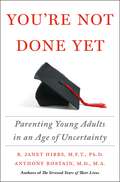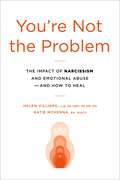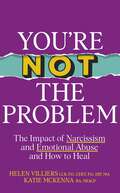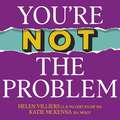- Table View
- List View
Women’s Behavioral Health: A Public Health Perspective
by Bruce Lubotsky Levin Ardis HansonThis book examines women's behavioral health (defined as alcohol, drug use, and mental health) problems from a population or public health perspective. It provides the current state of knowledge for women’s behavioral health and examines the need for behavioral health services and implications for policy. It also reviews major issues in the organization, financing, and provision of women’s behavioral health services. Global and national studies show that women are nearly twice as likely as men to have selected mental disorders. There also has been increasing attention to the social, behavioral, institutional, and economic determinants of health that result in service inequities for women in the United States compared to women in other countries. This textbook highlights mental and substance use disorders of particular concern to women, emphasizes services research issues in women’s behavioral health, incorporates the social determinants of health, and provides a discussion of these critical issues from an interprofessional and interdisciplinary public health perspective. It also presents an overview of the epidemiology of mental and substance use disorders across the lifespan of women and service delivery issues from a population and system-level perspective. Applied services research chapters comprise the book's 14 chapter contributions that are organized into three parts: Part I. Framing Women’s Behavioral Health; Part II. Selected At-Risk Populations; and Part III. Services Delivery issues. Women's Behavioral Health: A Public Health Perspective is a textbook for advanced undergraduate and graduate students in many academic disciplines, including the social and behavioral sciences, public health, women’s studies, medical anthropology, and medical sociology. It also is useful for postdoctoral students in public health, population health, and the health professions. This volume can serve as a reference book for academicians and researchers in community and social psychology, community health, community nursing, community and preventive medicine, and public health; practitioners and policymakers at various levels of government; and behavioral health professionals at mental health and substance use programs in various national and global healthcare organizations.
Women’s Drug Use in Everyday Life
by Emma EleonorasdotterThis open access book explores the increasing role of psychoactive substances in contemporary everyday life, focussing on women's use. Drawing on an ethnographic study in Sweden, it uses cultural studies and queer phenomenology to analyse the women’s narratives of drug use relating to themes that encompass social, legal, cultural, embodied and gendered perspectives on drugs in the contemporary Western world. It examines topics such as stigma, happiness, children, the body, gifts, the drug market, medication, sickness and health and also the orientation of themselves towards others, to social and cultural norms, to drug laws and to the substances. It discusses how drug related spaces and directions be analysed in terms of gender and class, and how, in turn, the directions of contemporary society and culture can be affected by drug use. It speaks to academics in Sociology, Criminology, Ethnology, Gender studies, Law and History.
Women’s Health and Pandemic Crisis
by Vivian Pramataroff-Hamburger Mechthild Neises-RudolfThis book focuses on the unique challenges for women in a pandemic situation, both as caretakers and patients. It has been noted that in the last two years medical doctors, psychologists, and health workers have seen a huge impact of the pandemic experience on women and their families. Children and adolescents suffered from a strong reduction of social contacts, while families had often to resort to cramped living condition that put a strain on normal life activities, especially in underprivileged areas of society. Fear and uncertainty reigned. All these factors caused a wide range of psychosocial symptoms, from loneliness to domestic violence, depression, and psychosomatic reactions. As health professionals, women have been influenced by the pandemic experience as well. Hospital staff, who had to care for a huge number of seriously ill patients in a very short time, were confronted with considerable expectations, which often turned into hostility, especially in the period before vaccinations became available. Psychotherapists received increased requests for appointments and had to adjust to video consultation for those they were able to accommodate in their practice.Seeing the pandemic crisis as an opportunity to learn from mistakes, and lack of preparation, fostering a greater understanding of women’s health in general, and the unique experiences of pregnancy, childbirth, trauma, adolescence, body experience, and gender identity that affects their health. This book gathers our current state of knowledge about women in the extreme situation of a pandemic crisis and points the way to an improved level of care for the future.“This timely view of women’s mental health in pandemics provides a vision to the path we must all take now to assist women in some of the most important elements of preventive care: their mental and emotional well-being … [T]his book emphasizes that the mental health of a mother must be considered in all circumstances. Well done for being the conscience we need!”- Jeanne Ann Conry, MD, PhD, President, The International Federation of Gynecology and Obstetrics, Past President, The American College of Obstetricians and Gynecologists, Immediate Past Chair, The Women’s Preventive Health Initiative (WPSI)
Women’s Journeys to Posttraumatic Growth: A Guide for the Helping Professions and Women Who Have Experienced Trauma
by Mary Ellen Doherty Elizabeth Scannell-DeschThis accessible book draws on research around women’s experiences to illustrate and explore the concept of posttraumatic growth, emphasizing practice implications for healthcare professionals and strategies for fostering posttraumatic growth. Including the voices of women, in their own words, Women’s Journeys to Posttraumatic Growth explains the differences between post-traumatic stress disorder and posttraumatic growth and presents the theoretical framework of posttraumatic growth. It synthesizes relevant international research and introduces data from four new qualitative research studies on posttraumatic growth in women who have experienced the death of a spouse or longtime partner, death of a child, a close brush with death, and intimate partner abuse. The book develops clinical and nursing practice implications for healthcare professionals and explores current self-help and professional therapeutic strategies to foster posttraumatic growth. Women’s Journeys to Posttraumatic Growth is an invaluable guide for health and social care practitioners, as well as students and researchers with an interest in trauma, abuse, bereavement and loss, and women’s healthcare.
Wonderstruck: How Wonder and Awe Shape the Way We Think
by Helen De CruzA philosopher explores the transformative role of wonder and awe in an uncertain worldWonder and awe lie at the heart of life&’s most profound questions. Wonderstruck shows how these emotions respond to our fundamental need to make sense of ourselves and everything around us, and how they enable us to engage with the world as if we are experiencing it for the first time.Drawing on the latest psychological insights on emotions, Helen De Cruz argues that wonder and awe are emotional drives that motivate us to inquire and discover new things, and that humanity has deliberately nurtured these emotions in cultural domains such as religion, science, and magic. Tracing how wonder and awe unify philosophy, the humanities, and the sciences, De Cruz provides new perspectives on figures such as Plato, Aristotle, Adam Smith, William James, Rachel Carson, Maurice Merleau-Ponty, Jean-Paul Sartre, and Abraham Heschel. Along the way, she explains how these singular emotions empower us to be open-minded, to experience joy and hope, and to be resilient in the face of personal troubles and global challenges.Taking inspiration from Descartes&’s portrayal of wonder as &“that sudden surprise of the soul,&” this illuminating book reveals how wonder and awe are catalysts that can help us reclaim what makes life worth living and preserve the things we find wonderful and valuable in our lives.
The Work of Donald Meltzer Revisited: 100 Years After His Birth (The International Psychoanalytical Association Psychoanalytic Classics Revisited)
by Carlos Moguillansky Gabriela LegorretaThe Work of Donald Meltzer Revisited: 100 Years After His Birth returns to and reassesses the contributions of Donald Meltzer, one of the most significant disciples of Melanie Klein and who was deeply inspired by Wilfred Bion.
Working with Anger Creatively: 70 Art Therapy-Inspired Activities to Safely Soothe, Harness, and Redirect Anger for Meaningful Change
by Erica CurtisWorking with anger takes a delicate balance of containment and expression. Creativity helps us do just that.Based on art therapy theory and practice, the activities, materials, instructions, process, and reflection questions in this practical guide are all thoughtfully designed as avenues for therapeutic change. Helpful tips provide adaptations for meeting the unique needs of art-adverse clients, as well as varying ages and abilities, so everyone can benefit from creative approaches to working with anger.Anger is a vital part of the emotional landscape, and a thoughtful approach to its nuances can make all the difference in avoiding harmful outcomes. The exercises in this book help you to guide clients toward finding meaningful roles for anger so that it enriches, rather than diminishes, their quality of life.
Working with Child and Adolescent Mental Health: The Central Role of Language and Communication (Working With)
by Susan McCoolIn children, mental health challenges and communication differences typically combine in complex and inter-related ways. Remarkably, this crucial point is all too often forgotten, and communication is overlooked. Services are frequently fragmented, leading professionals to look at children through distinct lenses of either mental health or communication, meaning insights can be incomplete and important perspectives unshared. Working with Child and Adolescent Mental Health makes the compelling case that communication is central and should be a primary consideration whenever we think about children’s mental health. With a practical focus, and an easy- to-read format, it suggests how this can be achieved by identifying how practitioners and services can work more cohesively to understand and optimise children’s communication capacities. This book includes: • Practical advice, grounded in current research, and presented in an easy-to-read, digestible style • Guidance to help practitioners competently and compassionately identify and respond to the needs of children and young people with complex combined communication and mental health needs • Real-life case studies from a wide range of settings, unpicked to clearly illustrate topics discussed in the book and offer encouragement and inspiration to practitioners • Checklists and questionnaires to help practitioners in daily practice • Recommendations for, and links to, useful additional resources • Tools to support reflection and enhancement for individual practitioners and services Essential reading for speech and language therapists, psychologists, mental health practitioners, educators, social workers, and anyone else concerned with children’s wellbeing and resilience, this book highlights the transformational impact of placing communication at the heart of all efforts to support children and young people’s mental health.
Working with Dreams in Transactional Analysis: From Theory to Practice for Individuals and Groups (Innovations in Transactional Analysis: Theory and Practice)
by Anna Emanuela Tangolo Francesca VignozziThis unique book, incorporating both theory and practice, provides an invaluable guide to the assessment of dreams in transactional analysis (TA).Grounded in the latest neuroscientific research, it offers both neophyte and experienced TA practitioners a pathway to incorporate a client’s dreams within individual and group therapy, exploring key issues including trauma, dissociation and nightmares, dreams of change and transformation, dreams of healing, and transference and countertransference in dreams.It will support therapists through the very first steps toward the analysis of more complex interpersonal dynamics and dream analysis in a group setting. Also discussing the direction of future research in the area, as well as an overview of an experiment on dream analysis during the recent pandemic, this will be key reading for anyone working in the field.
Working with Relational Trauma in Children's Residential Care: A Guide to Using Dyadic Developmental Practice (Guides to Working with Relational Trauma Using DDP)
by Kim S. Golding George Thompson Edwina GrantDyadic Developmental Psychotherapy (DDP) is a therapeutic approach, based in attachment theory, which is used to support children who have experienced relational trauma. By consciously offering PACE (playfulness, acceptance, curiosity, and empathy), adults can help children - and each other - to feel more secure and open to others. This guide provides an overview of DDP and explores how it can be used to support children in residential care settings. Case studies, examples, and expert guidance from the authors' extensive experience demonstrate how to apply the principles of DDP to daily practice. From integrating the PACE model into conversations - both with children and colleagues - to balancing physical safety with relational safety in secure care situations, this book offers a way to build a culture of support throughout the whole structure of residential care settings.
Working with Survivors of Sibling Sexual Abuse: A Guide to Therapeutic Support and Protection for Children and Adults
by Christiane SandersonSibling sexual abuse is considered to be one of the most common forms of child sexual abuse within the family setting, yet it is often ignored, downplayed or denied in spite the impact on survivors. Shining a spotlight on the hidden phenomenon, Christiane Sanderson provides a rigorous account of the nature and dynamics of sibling sexual abuse. She provides a clear explanation of the difference between developmentally appropriate, consensual sexual exploration and developmentally inappropriate, non-consensual sexual behaviour. The focus is on how these behaviours impact the sibling being harmed, the sibling who is harming, the wider family and adult survivors. This book is essential reading for anyone involved in assessing, supporting, safeguarding or treating individuals or families impacted by sibling sexual abuse and all those working with adult survivors.
Working with the Brain in Psychology: Considering Careers in Neuropsychology
by Lynn A. Schaefer Hilary C. BertischWorking with the Brain in Psychology: Considering Careers in Neuropsychology seeks to assist students in their career exploration, by introducing them early, in the contemplative stage of career planning, to the fascinating speciality of psychology known as neuropsychology. The text spends considerable time differentiating neuropsychology from alternative career paths, and provides personal accounts, contributions from neuropsychologists in various settings, and case examples of different patient populations to illustrate what it is like to train to become and work as a neuropsychologist. This text begins by describing what neuropsychology is, how it is situated within psychology, and for whom it could be a good fit. Suggestions are provided about how to engage in self-assessment in order to help choose a career. It goes on to review over a dozen similar and overlapping careers to illustrate how neuropsychology stands out. Quotes by professional neuropsychologists bring to life what "a day in the life" looks like in different settings, and the kinds of populations with whom neuropsychologists work are illustrated with case examples. This book then outlines how one becomes a neuropsychologist, including how to re-specialize from a different field. It also gives an honest appraisal of potential challenges that come with this career, and ends with anticipated future directions in the profession to look forward to. This book will be useful primarily for psychology-minded undergraduates and college graduates thinking of going on to graduate school for psychology, as well as for high school students interested in the brain and psychology. This book is further aimed at those considering a change of career from a related field into neuropsychology, as well as the guidance counselors and college career centers that assist with career planning.
The World of the Japanese Mind: Conformity and Seken (SpringerBriefs in Sociology)
by Noriatsu MatsuiThis book investigates the source from which the pressure to conform arises in Japanese society. Even though the contemporary Japanese word for “society” (Shakai) has a history of 140 years, it does not include the concept of respecting the individual but refers mainly to social frameworks and institutional aspects. At the same time, the traditional Japanese terms for “society”, primarily Seken, that have been in use for 1,400 years have embraced human relationships of the members of the group.The hypothesis of this book is that there is no “society” as such in Japanese people’s minds. By proposing a new model (the Hand-Carved Tripod Model) of conformity in Japan, the book shows the structure of the pressure to conform. The tripod is composed of ambiguous words, the sense of belonging, and the “air”, or understanding, that represents the unwritten rules and regulations of Seken.Conformity in Japanese people’s minds takesdifferent forms, from small residential groups to corporations at work, and to nationwide associations, but always dictates that people follow everyone else in the organization.This book examines the sense of being blocked in Japan that has prevailed over 30 years, during the period of the so-called Three Lost Decades in Japan. Examining phenomena such as low worker engagement, karoshi (death by overwork), high middle-age male suicide rates, bullying in school and at work, sex discrimination, hereditary membership in the Diet, and failure to provide adequate protection for whistle-blowers, this book reveals a common structure in Japanese minds: lack of respect for individuality, and the traditional and narrow sense of the world, i.e., Seken.This book will be beneficial to scholars and graduate students as well as to businesspeople who are interested in understanding the behavior and minds of Japanese people from the psychological,cultural, and historical viewpoints. It provides an integrated view of Japan’s Seken as the platform that generates their conformity.
Writing Philosophical Autoethnography (Writing Lives: Ethnographic and Autoethnographic Narratives)
by Alec GrantWriting Philosophical Autoethnography is the result of Alec Grant’s vision of bringing the disciplines of philosophy and autoethnography together. This is the first volume of narrative autoethnographic work in which invited contributing authors were charged with exploring their issues, concerns, and topics about human society, culture, and the material world through an explicitly philosophical lens. Each chapter, while written autoethnographically, showcases sustained engagement with philosophical arguments, ideas, concepts, theories, and corresponding ethical positions. Unlike much other autoethnographic work, within which philosophical ideas often appear to be "grafted on" or supplementary, the philosophical basis of the work in this volume is fundamental to its shifting content, focus, and context. The narratives in this book, from scholars working in a range of disciplines in the humanities and human sciences, function as narrative, conceptual, and analytical exemplars to act as a guide for autoethnographers in their own writing, and suggest future directions for making autoethnography more philosophically rigorous. This book is suitable for students and scholars of autoethnography and qualitative methods in a range of disciplines, including the humanities, social and human sciences, communication studies, and education.
The Year's Work in Showgirls Studies (The Year's Work: Studies in Fan Culture and Cultural Theory)
by Anna Breckon Kara Keeling Adrian Martin Kieryn McKay Jane Chi Park Zahra Stardust Billy Stevenson Shawna TangThe Year's Work in Showgirls Studies is a fan culture volume that deconstructs how and why Showgirls, a 1995 drama with a female lead bent on becoming a famous performer in Las Vegas, became a much-contested cult film despite being a critical failure when it released. The collection orchestrates a conversation between scholarly essay work and archival documentation offering a magnificent representation of the array of responses generated by the film, its makers, its promoters, and its audience. A multifaceted approach to the film, its popularity, and its social relevance results in a new text for understanding normative social hierarchies of sexuality, race, and gender. The Year's Work in Showgirls Studies engages with the figurative and actual place of sex work and feminized affective labor in our society.
You Can Go Home Again: Reconnecting with Your Family (Third Edition)
by Monica McGoldrick Tracey LaszloffyAre you ready to reconnect with family in a meaningful way, but unsure where or how to begin? This beloved classic poignantly explains how constructing the genogram, or a basic family tree, can help us to better understand and mend family relationships and dynamics. Readers learn how genograms can reveal a family’s history of estrangement, alliance, divorce, or suicide, exposing intergenerational patterns that prove more than coincidental. The book sheds light on a range of complex issues such as birth order and sibling rivalry, family myths and secrets, cultural differences, couple relationships, and the pivotal role of loss. In the third edition of this revelatory book, “godmother of genograms” Monica McGoldrick and family therapist Tracey Laszloffy focus on aiding readers in their own work to understand their family history and change their role in relationships where there is distance, conflict, or cutoff. Readers will also find new and updated material on the intergenerational transmission of trauma, the ramifications of uncovering family secrets via DNA testing, and more. If you’ve ever struggled to understand the complex dynamics of your family—and your place within it—this book is for you.
You Only Die Once: How To Make It To The End With No Regrets
by Jodi Wellman"YOU ONLY DIE ONCE is a spirited and funny but also profound and highly practical manual for anyone who yearns to show up more fully and wholeheartedly for their all-too-finite time on the planet."Oliver Burkeman, New York Times bestselling author of Four Thousand Weeks: Time Management for MortalsHow many Mondays do you have left? Does that question send you into a panic spiral, or are you convinced that, unlike everyone in the history of life on earth, you will somehow avoid the tragic end and live to tell the tale? Statistically, we get about 4,000 Mondays in our lifetime, so if you're halfway through your life, you might have roughly 2,000 Mondays to go. The good news is that you are in charge of how you spend those days: toiling at a job you hate, or creating a career you love; scrolling mindlessly for hours a day, or pursuing the hobbies and travel that light you up; dreading the end, or living a full life that allows you to greet the Grim Reaper with a smile.Built around the principles of positive psychology, You Only Die Once is the jolt that will bring you back to life, no near-death experience required. Full of practical takeaways and research-backed content, this book will motivate readers to take action on the life they want to be living, acting like a defibrillator for the soul. Accompanied by author Jodi Wellman's charming illustrations, this book won't lecture you about eating more kale or insist that the only path forward is to quit your job and move to Provence (although it's not not suggesting you do that either. The latter, that is. We'd never ask anyone to eat more kale.). Instead, it's a real-life guide to small changes that reawaken your passion and curiosity for life. Packed with inspiring stories, exercises, quizzes, quotes, and a step-by-step plan to awaken the liveliest version of you, You Only Die Once is the healthy dose of mortality you need to start living with urgency and meaning.
You Only Die Once: How To Make It To The End With No Regrets
by Jodi Wellman"YOU ONLY DIE ONCE is a spirited and funny but also profound and highly practical manual for anyone who yearns to show up more fully and wholeheartedly for their all-too-finite time on the planet."Oliver Burkeman, New York Times bestselling author of Four Thousand Weeks: Time Management for MortalsHow many Mondays do you have left? Does that question send you into a panic spiral, or are you convinced that, unlike everyone in the history of life on earth, you will somehow avoid the tragic end and live to tell the tale? Statistically, we get about 4,000 Mondays in our lifetime, so if you're halfway through your life, you might have roughly 2,000 Mondays to go. The good news is that you are in charge of how you spend those days: toiling at a job you hate, or creating a career you love; scrolling mindlessly for hours a day, or pursuing the hobbies and travel that light you up; dreading the end, or living a full life that allows you to greet the Grim Reaper with a smile.Built around the principles of positive psychology, You Only Die Once is the jolt that will bring you back to life, no near-death experience required. Full of practical takeaways and research-backed content, this book will motivate readers to take action on the life they want to be living, acting like a defibrillator for the soul. Accompanied by author Jodi Wellman's charming illustrations, this book won't lecture you about eating more kale or insist that the only path forward is to quit your job and move to Provence (although it's not not suggesting you do that either. The latter, that is. We'd never ask anyone to eat more kale.). Instead, it's a real-life guide to small changes that reawaken your passion and curiosity for life. Packed with inspiring stories, exercises, quizzes, quotes, and a step-by-step plan to awaken the liveliest version of you, You Only Die Once is the healthy dose of mortality you need to start living with urgency and meaning.
You Will Get Through This: A Mental Health First-aid Kit--help For Depression, Anxiety, Grief, And More
by Julie Radico Charity O’Reilly Nicole HelversonAn all-in-one guide to taking charge of your mental health, with research-proven strategies to alleviate daily struggles such as depression, anxiety, panic disorder, ADHD, and insomnia Months-long therapy wait-lists. Out-of-pocket costs. Online misinformation. There are more barriers than ever to accessing reliable mental health care—and when your mental health is suffering, you need help now. This book, written by three practicing therapists, is your comprehensive mental health first-aid kit. Drawing on the techniques they use with their clients, they offer a holistic understanding of more than twenty all-too-common life challenges, plus compassionate, evidence-based strategies for when you’re struggling. Even better, these are techniques that anyone can do at home. In each chapter, you’ll find: what the research says about the issue coping mechanisms that are used in actual therapy rooms step-by-step guidance on using these strategies in real life and overcoming common obstacles tips for communicating about the issue with your loved ones You’ll also find practical advice on accessing professional help, deciding if a therapist is the right fit for you (and breaking up with them if they’re not), and paying for therapy. You Will Get Through This illuminates the road to wellness so you can take charge of your own healing.
A Young Person’s Guide to Cognitive Behavioural Therapy for Eating Disorders
by Riccardo Dalle Grave Simona CalugiA Young Person’s Guide to Cognitive Behaviour Therapy for Eating Disorders is a state-of-the-art guide for young patients struggling with disordered eating based on enhanced cognitive behaviour therapy (CBT-E). CBT-E is one of the most effective treatments for eating disorders, including anorexia nervosa, bulimia nervosa and binge-eating disorder, which has recently been adapted for adolescents. Written by two experienced clinicians and clinical researchers working daily with teenagers suffering from eating disorders, and their parents, this book offers an effective mix of theory and clinical expertise that will appeal to all readers. The volume starts with a presentation the most current facts on eating disorders. Part 2 then provides young with eating disorders a complete description—accompanied by clinical examples and helpful vignettes on how to implement the main CBT-E procedures. While this book is specifically tailored for young people aged between 15 and 25 years with eating disorders treated with CBT-E, it will also be useful for all young persons affected by eating disorders, and clinicians using CBT-E with young patients.
Your Pocket Therapist: Break Free from Old Patterns and Transform Your Life
by Dr. Annie ZimmermanFrom psychotherapist and TikTok personality Dr. Annie Zimmerman comes a toolkit to transform yourself and your relationships, with advice on how to heal past trauma, build sustainable connections, and take ownership of your mental health.Every day, psychotherapist Dr. Annie Zimmerman meets clients in her private London practice who are struggling with their lives. They’re committed to achieving personal growth, making changes—but they’re struck at the question stage. They ask her: Why can’t I sleep? Why do I keep going back to a bad relationship? Why did I lose my temper? What is wrong with me?Here’s the thing: nothing is wrong with them. It’s just that they’re asking themselves the wrong questions.In Your Pocket Therapist, Dr. Zimmerman helps readers delve into their past to identify old, unhelpful patterns and teach them how to unlock the present. The book combines practical tools with anecdotes gleaned from the therapy room, distilling complex psychological concepts with her signature warmth and empathy. Her belief—galvanized by her hundreds of thousands of followers—is that if we learn to understand the roots of our suffering, we can bring about meaningful—and permanent—change in our lives. It comes down to learning how to ask the right questions.A brilliant, necessary toolkit for those who want to break free from past patterns and embrace a life of abundant self-awareness and connection, Your Pocket Therapist is an absolute must-read in the field of psychology.
You're Not Done Yet: Parenting Young Adults in an Age of Uncertainty
by Dr. B. Janet Hibbs Dr. Anthony RostainA clear-eyed, optimistic guide for parents with adult children who need help navigating the challenges to launching an independent life.Times were already tough for young adults looking for ways to start living independent lives after high school and college: rents were up, wages were down, student loan debt was burdensome, then the Covid-19 pandemic hit. A generation of young people were forced out of their classrooms, jobs, and social lives, returning home to live with their parents. Now many of these young adults carry the scars of the internal pandemic, with increased anxiety and depression, poor coping, and the uncertainty of how to restart their lives. Parents want to help, but the old rules of advice-giving can clash with the need to respect their child’s autonomy. In You’re Not Done Yet, two leading adolescent and young adult mental health experts provide a practical and compassionate path to parents combatting the worry and frustrating isolation many feel when supporting their twentysomethings. Hibbs and Rostain explain when and how developmental markers changed, and invite parents and young adults to learn new, more effective ways of communicating with each other. Part I of the book covers the “new normal,” of young adulthood, with its educational and career changes. The new normal of parent-child relationship asks us to rethink our “shoulds,” and in the process develop a closer relationship based on talking and listening to understand each other, rather than “being right.” Part II addresses the common and challenging problems that arise when mental illness creates a drag on a young adult’s progress, and shows how parents may be engaged in their child’s treatment. Packed with helpful information and step-by-step guides to specific problems, this book will be an invaluable resource for parents and their twentysomething children.
You're Not the Problem: The Impact of Narcissism and Emotional Abuse and How to Heal
by Helen Villiers Katie McKennaTwo popular psychotherapists explore narcissism in family of origin, unpacking the fallout from being raised by narcissistic parents, and offering strategies for how to heal. Many emotionally abusive behaviors from parent to child have become socially acceptable because of the way we repeat things our parents said and did, things passed down from generation to generation that persist today. You're Not the Problem enables us to recognize these behaviors and realize the profound impact they have had, and still have, and to see the patterns they form in our relationships with parents, partners and friends. It also shows us how to heal on a personal level but also on a societal level. The legacy and the damage caused by narcissistic and emotional abuse will carry on, perpetuated by trauma and repeating cycles, unless we learn to recognize and understand it, unless we as individuals and as a society learn how to challenge it and stop its vicious cycle of destruction—which is what this book sets out to do. This book will explain and illustrate: How to recognize emotional abuse in family relationships: its language and behaviors The immediate and long term impact of these behaviors Strategies for healing How to avoid repeating these behaviors Using client narratives and sample scripts, Villiers and McKenna offer a compassionate, sympathetic approach to looking at our familial patterns—and how we can break free from these toxic relationships and reclaim our lives.
You’re Not the Problem: The Impact of Narcissism and Emotional Abuse and How to Heal
by Katie McKenna Helen VilliersHelen & Katie's advice will change your life. It did mine. - Kay Allinson, co-founder of Pinch of NomThis book will show you what a narcissist looks like and how their emotional abuse impacts the lives and relationships of their families.Many emotionally abusive behaviours from parent to child have become socially acceptable; because they're so prolific, they're normalised. Furthermore, humans often repeat relational patterns, passing the baton of trauma from generation to generation, until someone decides to change things. You're Not the Problem shows you how to recognise these behaviours and realise the profound impact they have had, and still have, and to see the patterns they form in our relationships with parents, partners, friends and colleagues. Using stories and examples from their clinical experience and extensive research, psychotherapists Helen Villiers and Katie McKenna share: · What Narcissistic Personality Disorder is· How to recognise emotional abuse in family relationships· The immediate and long-term impact · Practical strategies for healing· How to avoid repeating these behaviours With a compassionate, sympathetic approach to looking at your familial patterns, Villiers and McKenna show you how to truly break free from these toxic relationships and reclaim your life.
You’re Not the Problem - Sunday Times bestseller: The Impact of Narcissism and Emotional Abuse and How to Heal
by Katie McKenna Helen VilliersTop 10 Irish Bestseller'Helen & Katie's advice will change your life. It did mine.' - Kay Allinson, co-founder of Pinch of NomThis book will show you what a narcissist looks like and how their emotional abuse impacts the lives and relationships of their families.Many emotionally abusive behaviours from parent to child have become socially acceptable; because they're so prolific, they're normalised. Furthermore, humans often repeat relational patterns, passing the baton of trauma from generation to generation, until someone decides to change things. You're Not the Problem shows you how to recognise these behaviours and realise the profound impact they have had, and still have, and to see the patterns they form in our relationships with parents, partners, friends and colleagues. Using stories and examples from their clinical experience and extensive research, psychotherapists Helen Villiers and Katie McKenna share: · What Narcissistic Personality Disorder is· How to recognise emotional abuse in family relationships· The immediate and long-term impact · Practical strategies for healing· How to avoid repeating these behaviours With a compassionate, sympathetic approach to looking at your familial patterns, Villiers and McKenna show you how to truly break free from these toxic relationships and reclaim your life.
